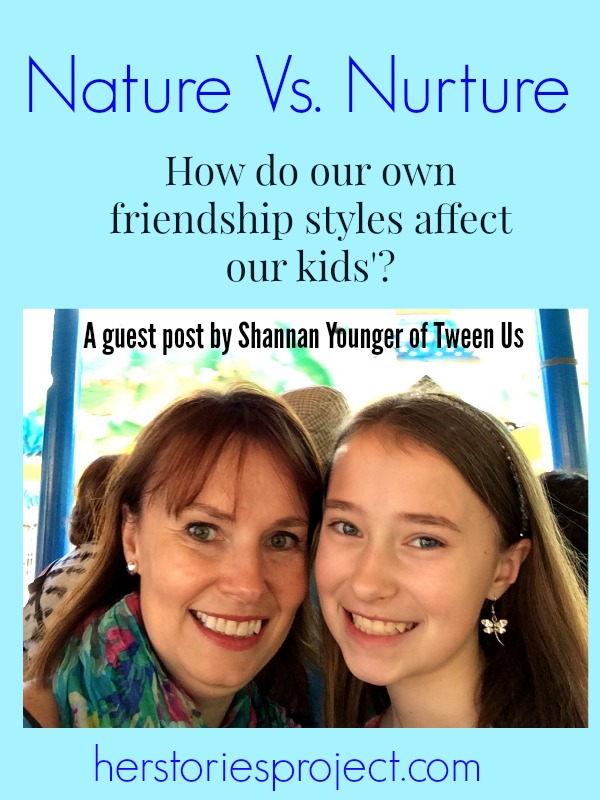Our guest post today comes from contributor Shannan Younger of the blog Tween Us. In her post, Shannan wonders how her own friendship style may be influencing her daughter. What are your hopes for your child’s friendships?
Freud believed that personality was fully formed by age 5. As the mom of an 11 year-old girl, I’ve been pondering that statement lately and specifically thinking about how personality impacts friendships.
I think the vast array of personalities gives everyone a different, unique approach to friendships.
Just a few close friends work really well for a lot of women I know, but there are also those who prefer or even need to be surrounded by large groups.
Some ladies form close bonds immediately, if not sooner, whereas others take a while to really warm up.
Ending a friendship is never easy, but there are women who are more comfortable with the idea of friendship for a season, however brief that may be, and who are the opposite of those who are always hoping for a life-long bond.
Watching my child’s approach to friendships has been fascinating, especially as her social world continues to evolve. Even if the ideal was never fully realized, the “we’re friends with everyone in the class” approach made kindergarten seem so welcoming, but was emphasized less and less each year. And now my daughter is in junior high.
The transition has meant learning to navigate both a new school and a new friendship landscape. The addition of both a large number of new classmates and raging hormones have been thrown into the mix. There’s a lot of drama. Not that there wasn’t any friendship drama in elementary school, but this is a whole new level.
It’s not unfamiliar territory.
I remember my middle school days as challenging in large part due to friend drama. While at the time it seemed that everything was happening to just me, tween female friendship troubles were and still are fairly universal.
As my daughter’s friend drama amps up, I wonder to what extent I am responsible for her preferences. How does the nature vs. nurture debate factor into female friendships?
We have similar but not identical approaches to friendships, from I can tell so far (and goodness knows there’s a lot that goes in the mind of an 11 year-old to which her mother is not privy). My daughter’s friendships are like a bullseye, different circles that expand and are less central to her as you move out. In that way, she’s similar to me. I wonder if I had larger friend groups and handled crowds better if she would cast a wider net herself. I doubt it, though. She’s more reserved with new friends than I am, she’s a little more likely to take things slow and a little less outgoing.
I used to spend time worrying about how she would manage friendships. I’ll be honest and say that I still do, a bit. She has to handle friends who are more deft at social engineering, the friends who are not always honest, and the friends who far more worldly than she is. Then it occurred to me that those are friendship issues to be managed at any age.
I want to give her the space to do that, even if it means biting my lip really hard sometimes or cringing when things are rough. They are her friendships, hers to learn how to handle, to choose to cultivate, to learn from and to nurture, or not. My wish for her is that she finds friends. The number is not overly important, who love her for who she is, who give her understanding at this age when it feels like parents cannot begin to do so and who bring out the best in my special girl.

 Follow
Follow
